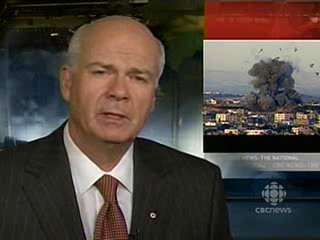| Canadian Media Regret Their Errors January 30, 2009 By: Mike Fegelman Dear HonestReporting Canada subscriber: Serge Schmemann, former deputy foreign editor of the New York Times, once wrote: "There is nothing a journalist fears more than having a correction printed about his story." A media outlet's willingness to issue a correction and to rectify its error is a fair indicator of a news organization's commitment to media accountability and to its overall integrity. In January alone, HonestReporting Canada and our members obtained an abundance of corrections and retractions by Canadian news organizations as the conflict between Israel and Hamas carried on. Here is a short list detailing our continued efforts and the latest media developments. CBC.CA ISSUES CORRECTION AFTER HRC INTERVENTION On January 23, CBC.ca issued the following correction to remedy their error: CBC "THE NATIONAL" ISSUES ON-AIR CORRECTION CBC "The National" issued the following on-air correction on January 13 after the network wrongly implied that then president-elect Barack Obama had only expressed concern about the loss of civilian lives in the Gaza Strip, whereas in fact, he had also expressed vocal concern for the loss of civilian life in Israel as well. To view the original error and the on-air correction online click on the images below.
MONTREAL GAZETTE CORRECTS "OCCUPIED TERRITORY" REFERENCE HRC PROMPTS CANWEST TO ISSUE CORRECTION Canwest News correspondent Matthew Fisher reported on January 10 that: "Humanitarian aid deliveries had been suspended on Thursday after two truck drivers were killed by what the UN said was an Israeli tank attack." Contrary to this statement and as this Toronto Star correction confirms, only one UN driver was killed. More importantly, this report failed to indicate that the Israel Defense Forces had denied any responsibility for the death of the aid worker. As the Jerusalem Post reported also on January 10: "The IDF was not responsible for the death of a Palestinian aid worker contracted to the UN and the wounding of two others on Thursday, the IDF Spokesman said Saturday. Given the aforementioned error and serious omission, we asked Canwest News to rectify the false misconception that "two truck drivers were killed" and to update their readers about the new evidence which seems to exonerate any Israeli culpability in the aid worker's death or to at least cast some doubt into the UN's version of events. On January 13, Canwest News issued the following correction (as seen below in the Montreal Gazette) over its wire service: TORONTO STAR ISSUES CORRECTION AFTER HRC INTERVENTION On January 9, the Toronto Star did just that: TORONTO SUN WRONG ON "ISRAELI SETTLEMENTS" After the Toronto Sun's Peter Worthington had incorrectly described Hamas rocket attacks as being directed at Israeli "settlements," the following letter was submitted by HonestReporting Canada and printed in the January 16 edition to remedy this error: HonestReporting Canada congratulates its members whose involvement and support have been crucial in keeping the media honest. By sending letters of complaint, you ensured that news organizations acknowledged and corrected their mistakes, and became sensitive to the facts of the Middle East. HonestReporting.ca To support our continued efforts to hold the Canadian news media accountable for their reporting on Israel, please donate here today. Through your donations, you can help ensure that Canadian journalists are held to the highest standards of "Honest Reporting." Or send a cheque to: HonestReporting Canada P.O. Box 6, Station Q, Toronto, Ontario M4T 2L7 (416) 915-9157 Thank you for your ongoing commitment to fair and accurate | ||
| You are currently subscribed to honestreportingcanada as: pressing4truth.canada@blogger.com To unsubscribe click here or send a blank email to leave-9143648-30846861.70055780e4c7785a46ecfd4be95feb9c@pr1.netatlantic.com |



No comments:
Post a Comment